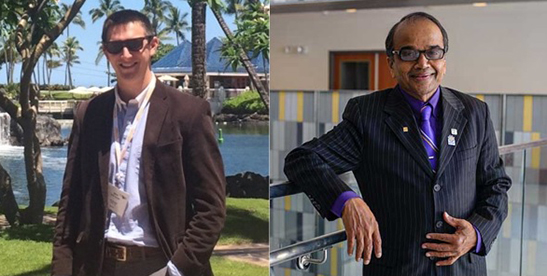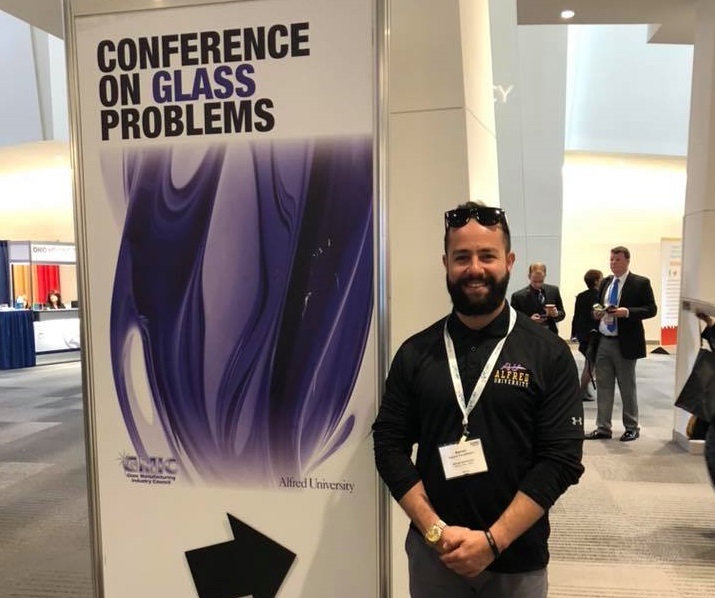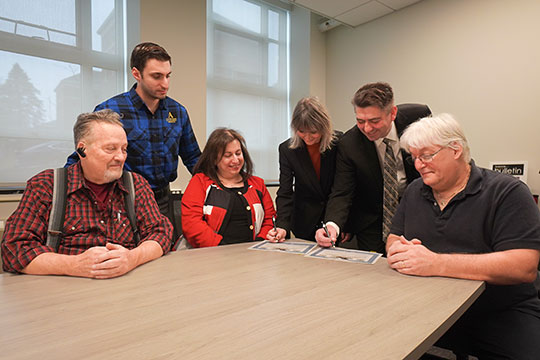
Bachelor of Science in Renewable Energy Engineering
One of only a few true renewable energy engineering programs of its kind
Become an expert in an industry that's changing the way society uses energy with Alfred University’s renewable energy engineering bachelor’s degree (REE). One of only a few true renewable energy degree programs seated in a strong engineering foundation, this program gives you the tools, technology, and know-how you need following graduation to enter the growing renewable energy job market with countless opportunities.
Major
Double Major
Learn More
Minor
Students pursuing the Bachelor of Science in Renewable Energy Engineering will complete the following courses:
- CHEM 105 General Chemistry I
- CHEM 106 General Chemistry II
- ENGR 101 Introduction to Engineering
- ENGR 102 Computer Aided Design
- ENGR 104 Computer Aided Engineering
- ENGR 110 Technical Communication
- ENGR 117 Engineering Foundations II
- ENGR 220 Circuit Theory I
- ENGR 305 Engineering Statistics
- ENGR 306 Engineering Economics
- ENGR 395 Engineering Design
- ENGR 490 Senior Capstone Project
- MATH 151 Calculus I
- MATH 152 Calculus II
- MATH 253 Calculus III
- MATH 271 Differential Equations
- MECH 212 Dynamics
- MECH 320 Thermodynamics I
- MECH 324 Fluid Mechanics I
- MECH 326 Heat Transfer
- MECH 354 Mechatronics
- MECH 422 Control Systems
- MECH 435 Industrial Controls
- PHYS 125 Physics I
- PHYS 126 Physics II
- RNEW 201 Intro to Renewable Energy
- RNEW 255 Power Systems and Economics
- RNEW 303 Software Engineering
- RNEW 310 Fuel Cell Principles and Techniques
- RNEW 320 Circuit Theory II
- RNEW 322 Signals and Systems
- RNEW 431 Wind Energy Systems
- RNEW 432 Solar Energy Systems
- RNEW 468 Electric Machinery
- Technical Elective
- Humanities, Social Science and Arts electives
For more information, please review the School of Engineering Curriculum by Semester Worksheets by degree program.
Minor in Renewable Energy Engineering
The minor in renewable energy engineering is ideal for students majoring in science and engineering who want to learn more about renewable energy.
Core Courses
- RNEW 201 Sources of Renewable Energy
- MECH 324 Fluid Mechanics
- MECH 326 Heat Transfer
Elective Courses (Choose two from the following list)
- CEMS 352 Electroceramics
- RNEW 310 Fuel Cells Principles and Techniques
- RNEW 431 Wind Energy
- RNEW 432 Solar Energy Systems
Renewable Energy Engineering is available as a double major to any Inamori School of Engineering undergraduate. Students earning a double major in Renewable Energy Engineering will complete all required courses for Renewable Energy Engineering along with courses required for their primary Engineering major.
REE Program Mission Statement
The REE Program at Alfred University is dedicated to the study and practice of Energy systems for a sustainable environment. Our mission is to produce the next generation of engineers and scientists who will develop and perfect renewable energy systems, make improvements on energy efficiency, and advance science and engineering with an economic sense in the aim to create a more sustainable future for our planet. Students of the REE program at Alfred will learn elements of mechanical and electrical engineering and business related to the generation, delivery and consumption of energy from renewable sources. Our systems level approach to education gives students access to the latest technologies and the wherewithal to apply them. Graduates of our program will work in the energy industries which specialize in renewable systems. They will work in industry as professionals trained in government regulation, or be regulators themselves. They will assist corporations in improving transmission and grid integration, power markets, utility operation and planning methods, and product management. They will be able to communicate results to a broad audience including industrial, government and the public sector.
The REE Program Mission Statement is consistent with that of the University and the SoE. Essential parts of the three Mission Statements are that students will be (1) good academicians, (2) good citizens, and (3) self-learners. This is consistent with the University’s major strength of being a comprehensive educational institution that provides individualized attention to the learning process.
ABET Accreditation
The BS program in Renewable Energy Engineering is accredited by the Engineering Accreditation Commission of ABET under the General Criteria.
If you have varied interests in engineering but are unsure which you excel at or enjoy working with the most, consider exploring our Undecided Engineering pathway. The Inamori School of Engineering provides this option to students who are undecided as first-year students and allows them to discover the field of engineering that's the best fit for them.
| Major | 2022 | 2021 | 2020 | 2019 | 2018 | 2017 | 2016 |
|---|---|---|---|---|---|---|---|
| Biomat. Eng./Biomed Mat. Eng. | 24 | 25 | 32 | 30 | 31 | 33 | 34 |
| Ceramic Engineering | 35 | 39 | 44 | 61 | 68 | 68 | 63 |
| Electrical Engineering | N/A | N/A | N/A | N/A | N/A | N/A | N/A |
| Glass Engineering Science | 11 | 11 | 19 | 23 | 24 | 15 | 15 |
| Materials Sci and Engineering | 19 | 31 | 38 | 36 | 48 | 48 | 48 |
| Mechanical Engineering | 119 | 145 | 167 | 194 | 168 | 182 | 185 |
| Renewable Energy Engineering | 19 | 27 | 40 | 44 | 29 | 30 | 44 |
| Undecided Engineering | 18 | 17 | 34 | 22 | 26 | 26 | 37 |
| Non-Degree | 0 | 0 | 0 | 2 | 4 | 4 | |
| Unduplicated Headcount | 245 | 295 | 374 | 410 | 394 | 402 | 426 |
| Major | 2022-2023 | 2021-2022 | 2020-2021 | 2019-2020 | 2018-2019 | 2017-2018 | 2016-2017 |
|---|---|---|---|---|---|---|---|
| Biomat. Eng./Biomed Mat. Eng. | 3 | 4 | 12 | 7 | 4 | 8 | 7 |
| Ceramic Engineering | 8 | 15 | 8 | 21 | 16 | 12 | 19 |
| Electrical Engineering | 0 | 0 | 0 | 0 | 0 | 0 | 0 |
| Glass Engineering Science | 2 | 2 | 7 | 3 | 3 | 0 | 4 |
| Materials Sci and Engineering | 7 | 15 | 8 | 9 | 16 | 7 | 10 |
| Mechanical Engineering | 28 | 58 | 35 | 53 | 36 | 51 | 37 |
| Renewable Energy Engineering | 13 | 11 | 14 | 6 | 10 | 10 | 12 |
| Total Degrees | 61 | 105 | 84 | 99 | 85 | 88 | 89 |
Engage with your peers in student clubs of all kinds. Renewable energy engineering students at AU can join clubs like the Saxon Racing club, the Society of Women Engineers and more.
What Will You Do?
Within the past few years, graduates have obtained jobs as:
- Engineer - NYISO
- Technical Product Manager for Power Film - AVX Corp.
- Solar Technician - SunBug Solar
- Glass Engineer - Owens Illinois
- Process Engineer - AVX Corp.
Program Educational Objectives
The objectives of the REE Program are to produce graduates who can attain, within a few years of graduation,
- Advancement within a multidisciplinary career within the context of renewable energy in industry, or advancement in postgraduate studies, or a related field.
- An ability to actively engage in teams that solve problems with independent thinking with a drive towards excellence in their job/study performance.
- Adopt the engineering method with their lifelong learning skills with an understanding of complex social issues where renewable systems will play a key role.
Alfred University uses program educational objectives as a method for outlining program outcomes and objectives. Program educational objectives (or PEOs) are broad statements that describe what we expect graduates of AU's renewable energy engineering program to attain 3-5 years after graduation. PEOs are reviewed and revised regularly to ensure that the program’s educational objectives are relevant to the needs of today's employers.
Program Outcomes (Student Learning Outcomes)
Graduates of the Renewable Energy Engineering program at Alfred University will have:
- An ability to identify, formulate, and solve complex engineering problems by applying principles of engineering, science, and mathematics.
- An ability to apply engineering design to produce solutions that meet specified needs with consideration of public health, safety, and welfare, as well as global, cultural, social, environmental, and economic factors.
- An ability to communicate effectively with a range of audiences.
- An ability to recognize ethical and professional responsibilities in engineering situations and make informed judgments, which must consider the impact of engineering solutions in global, economic, environmental, and societal contexts.
- An ability to function effectively on a team whose members together provide leadership, create a collaborative and inclusive environment, establish goals, plan tasks, and meet objectives.
- An ability to develop and conduct appropriate experimentation, analyze and interpret data, and use engineering judgment to draw conclusions.
- An ability to acquire and apply new knowledge as needed, using appropriate learning strategies.
Student Stories
News
Similar Programs
Students enrolling in the Renewable Energy Engineering major often bolster their education by double majoring or minoring in these other closely related fields:




